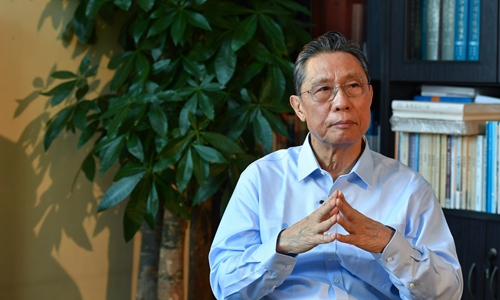HOME >> CHINA,SPECIAL-COVERAGE
Zhong's tears for Dr Li Wenliang not to be twisted
By Yang Sheng Source:Global Times Published: 2020/2/12 23:08:40

Chinese renowned respiratory scientist Zhong Nanshan receives an interview with Xinhua in Guangzhou, south China's Guangdong Province, Jan. 28, 2020. (Xinhua/Liu Dawei)
A top Chinese epidemiologist and senior medical adviser in the fight against the COVID-19 was once again thrown into the spotlight not because of his observation on the epidemic development but his emotional response to the death of Li Wenliang, a Wuhan doctor who won widespread respect for raising the alarm about the coronavirus.
Zhong Nanshan, the renowned senior medical advisor for the government, shed tears about Li's death in an interview with Reuters on Tuesday. His response to Li's death underlines the outburst of emotions by Chinese frontline medical workers under pressure in the battle against the COVID-19 outbreak.
"The majority of people think he's a hero of China," Zhong said to Reuters, wiping away tears. "I'm so proud of him, he told people the truth at the end of December, and then he passed away."
"Zhong Nanshan shed tears when talking about Li Wenliang" became a hot topic that received more than 130 million views on Chinese twitter-like social media platform Sina Weibo.
A Wuhan-based doctor who asked not to be named told the Global Times that "Li is a doctor like every one of us [doctors]. If Zhong or anyone of us understood the severity of the situation in December, we would do the same thing to warn everyone."
"And anyone of us could be infected and even die before the final victory that we are fiercely striving for against the epidemic. In other words, anyone of us could become Li," the young doctor said.
However, Zhong's tears were twisted and politicized by some as a challenge to the Chinese authority just as some mislabeled Li as a "dissident" who was "prosecuted" by the Chinese government.
Chinese analysts and medical workers noted that politicizing Zhong's tears is distorting Zhong's original intentions and plain expression of emotions about the death of a respected fellow medical worker.
Zhong, also a member of the Communist Party of China (CPC) and patriot, feels the pain and is moved by the sacrifice of all medical workers who are fighting on the frontline, and for the sacrifice that Wuhan and the entire Hubei Province have made to minimize the virus' impact on the country and the world, as well as all the tragedies that the Chinese nation has suffered in history.
Zhong also shed tears for Wuhan when being interviewed in January, noting that "with help from across the country, Wuhan, a heroic city, will pull through," Zhong said.
His eyes moistened when he said that one of his students told him that some people in Wuhan sang the national anthem when they were under home quarantine, a fact which Zhong said strikes him as he believes that when people get strength, they can solve a lot of problems.
Zhong, who won fame for combating the SARS epidemic in 2003, was himself hailed by many Chinese people as "the backbone of the Chinese people and the nation."
No official data has been released about casualties regarding medical workers in the fight, but multiple reports about the death of a doctor were circulating at the beginning of the fight.
Xu Hui, 51, deputy head of the Nanjing Hospital of Chinese Medicine, who uninterruptedly worked for 18 consecutive days died from a "sudden illness" on Friday.
Lou Qinjiang, Jiangsu Party chief, encouraged all officials and personnel to learn from Xu's spirit.
The reputation of medical workers in Chinese society will be greatly enhanced as they sacrifice so much in this fight, and the government also needs to better promote the treatment of these people and encourage more talents to serve in this field, said Chinese experts.
RELATED ARTICLES:
Posted in: SOCIETY